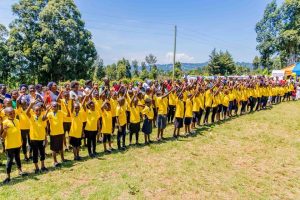By Elizabeth Angira
Worth Noting:
- According to UNICEF FGM at least 200 million girls and women in 31 countries across the sub-Saharan Africa, the Arab states and selected counties in Asia.
- Kisii County Governor’s First Lady, May Arati, emphasized the importance of ending Sexual and Gender-Based Violence (SGBV) and other forms of abuse within families.
- She stressed the need to empower women economically to ensure they are aware of their rights, considering women as agents of change in society.
- Arati called on well-wishers to support and train women, fostering their empowerment to stand against all forms of abuse.
- According WHO Female genital mutilation (FGM) is a traditional harmful practice that involves the partial or total removal of external female genitalia or other injury to female genital organs for non-medical reasons.

In an effort to eradicate Female Genital Mutilation (FGM), Kisii County has undertaken an intensive Alternative Rite of Passage program to replace the outdated cultural practice.
According to the 2022 Kenya Demographic Health Survey (KDHS), the prevalence of this harmful practice has decreased significantly, plummeting from 38 percent in 1998 to just 15 percent 2022.
Recently, 93 girls who rejected the cut in Kisii County successfully graduated after participating in a training on Alternative Rites of Passage (ARP), organized by CECOME, a group dedicated to combating FGM in the region.
During the graduation ceremony at Ragogo, Kitutu Chache South, where the program coordinator highlighted the success, Ruth Moraa, a parent of one of the graduates, expressed the significant benefits of the training.
She urged other parents not to subject their children to FGM, emphasizing the negative impacts associated with the practice.
According to a survey conducted by the Kenya National Bureau of Statistics (KNBS), 3 out of 20 women aged, 15–49 in Kenya have undergone the cut.
The survey also revealed that the majority of women, who have experienced this practice, accounting for 9 out of 20, fall within the age group of 10 to 14.
Additionally, among women who have undergone the act, 3 out of 10 of them are between the ages of 5 to 9.
Bella Masanya, the program coordinator, explained that ARP mimics traditional rites of passage but offers a safer and more empowering alternative to the life-threatening FGM.
The initiative involved training both girls and their parents since August, culminating in a joint declaration against FGM during the graduation ceremony.
According to KDHS in Nyamira County, 75 cases of FGM were reported, and Kisii County, with 77 cases, there is a collective need for the community to take a stand against this harmful practice.
Despite progress in the fight against FGM, Masanya highlighted challenges in implementing the ban at the grassroots level.
She called upon stakeholders, the government, and well-wishers to provide support to further reduce FGM incidents in the county.
Masanya challenged the community to reject FGM, emphasizing its retrogressive and illegal nature.
According to UNICEF FGM at least 200 million girls and women in 31 countries across the sub-Saharan Africa, the Arab states and selected counties in Asia.
Kisii County Governor’s First Lady, May Arati, emphasized the importance of ending Sexual and Gender-Based Violence (SGBV) and other forms of abuse within families.
She stressed the need to empower women economically to ensure they are aware of their rights, considering women as agents of change in society.
Arati called on well-wishers to support and train women, fostering their empowerment to stand against all forms of abuse.

According WHO Female genital mutilation (FGM) is a traditional harmful practice that involves the partial or total removal of external female genitalia or other injury to female genital organs for non-medical reasons.
It is estimated that more than 200 million girls and women alive today have undergone female genital mutilation in the countries where the practice is concentrated. In addition, every year an estimated 3 million girls are at risk of undergoing female genital mutilation, the majority of whom are cut before they turn 15 years old.
FGM has no health benefits. It can lead to immediate health risks, as well as long-term complications to women’s physical, mental and sexual health and well-being.
Peter Otachi, Monyerero ward representative, called on residents to report FGM cases to the authorities, emphasizing the need for legal action against those involved.




